US Mortgage Tax Deduction Remains Touchy Subject For Romney, Ryan And GOP

The government's role in the housing market does not generally inspire the same impassioned responses as abortion or health care, but the future of one mortgage tax policy could affect the fate of around $85 billion in annual taxpayer benefits.
The mortgage interest deduction allows homeowners to deduct their mortgage interest payments from their tax returns, limited to up to $1 million of a mortgage's value. The deduction is considered sacred by many Americans, and the Republican Party and presidential candidate Mitt Romney have grappled with its future as they seek to run on a platform of simplifying the tax code.
Earlier this week, the Republican draft committee reversed its position after lobbying from the real estate industry, voting to continue to press for tax code reforms, but if that failed, to preserve the mortgage interest deduction.
Real estate groups cheered the decision as a victory for middle-class homeowners -- although homeowners with more expensive homes save more money, and the deduction could also directly benefit their own business.
“At a time when so many are struggling to recover from the recession, this action helps cement much-needed political support for a tax break that primarily benefits middle-income families, said Jerry Howard, CEO of the National Association of Home Builders, a construction industry group, in a statement. The NAHB said in a January poll that 77 percent of Republicans, 71 percent of Independents and 71 percent of Democrats oppose eliminating this important tax break.
“Middle-class voters have seen their household wealth decline throughout the recession, and to a large extent they are the ones who will decide the outcome of this election,” Howard added. “They are also the prime beneficiaries of the mortgage interest deduction. With this in mind, it seems obvious that maintaining this cornerstone of American housing policy should be among lawmakers’ primary goals.”
Romney's stance on the issue is less definitive. He declined to identify what deductions he would seek to cut in an interview with Time magazine this week. I know our Democrat friends would love to have me specify one or two so they could amass the special interest to fight that effort, Romney told Time. There are a wide array of ways to limit deductions and exemptions for people at the high end and those options are ones which would be worked out with Congress on a collaborative basis.
Paul Ryan, Romney's vice presidential running mate, has promoted a large overhaul for the federal budget, and said in February that the mortgage interest deduction could be ended just for high-earning Americans, while preserved for lower tax brackets. Ultimately, Ryan said the House Ways and Means Committee should be responsible for making specific cuts.
Inquiries to the Romney campaign and the Republican National Committee were not immediately returned. A representative for Ryan referred inquiries to the Romney campaign.
© Copyright IBTimes 2024. All rights reserved.





















